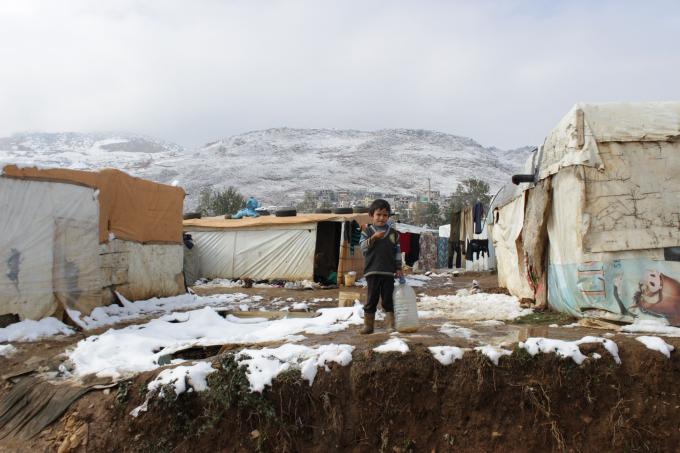Lebanon’s Winter Programme

Save the Children’s biggest ever shelter initiative, which took place in Lebanon over the past several months, has been a huge success, exceeding its targets and accounting for delivering more than 35 per cent of all winter shelter kits delivered to refugees in Lebanon, according to UNHCR data.
Since September alone the shelter team has provided shelter winterisation support to 8,545 households (more than 42,000 beneficiaries) and also provided technical support to help families weatherproof their tents and unfinished buildings. In total Save the Children’s shelter team distributed over 10,000 shelter kits for weather-proofing during 2013.
This represents a massive achievement for Save the Children and the Shelter Team in particular; they have worked tirelessly, delivering up to 200 weatherproofing kits a day. As a result of their efforts, every day as many as 1,000 vulnerable refugees – mostly women and children – had their shelters reinforced, weatherproofed, before winter arrived in earnest. When storm Alexa hit in December, the Save the Children reinforced shelters withstood the blizzards and high winds that ravaged the region for days.
Helping the most vulnerable refugee families in Lebanon prepare for winter was a particularly challenging task given the complexity of the refugee housing crisis here. There are no formal camps and families who cannot afford the spiraling rents are increasingly finding themselves in makeshift shelters in one of the more than 450 informal settlements that have sprouted up throughout the northern and Bekaa regions, most of them during the past year.
Lebanon is hosting more than one million refugees, the largest number of any country in the region and the equivalent of a quarter of Lebanon’s population of 4.2 million people. It is ill equipped to deal with such a rapid surge in its population and the country’s fragile infrastructures are threatening to implode under the weight of the crisis.
The harsh Lebanon winter posed a particular threat to the lives and health of more than quarter of a million refugees - including some 150,000 children - who were facing the winter huddled under temporary shelters made from plastic and rags, and in unfinished buildings and structures that were never intended for human habitation.
Conditions for families living in informal settlements are abysmal. Most of the 250 settlements in which Save the Children provides shelter support lack even the most basic water and sanitation services. Small children often have to walk long distances along dangerous roads to access clean water. Raw sewage and rodent infestation provide additional health hazards.
But the winter brought new misery: the driving rain, snow and high winds meant that many of the tents and makeshift shelters were in danger of being flooded or destroyed. Keeping warm in sub zero temperatures is difficult enough – drying out clothing or shelter and mattresses that have been soaked by rain, melting snow and flooding is near impossible. Children and the frail become more vulnerable to illnesses caused by freezing temperatures and damp – life threatening respiratory diseases like pneumonia as well as frostbite and hypothermia represent a serious threat. In this context, providing shelter support is a life saving activity.
Further complicating our response, hundreds of people continued to pour over the border into Lebanon on a daily basis. In a ten-day period in November alone, some 20,000 refugees fled into Arsal, following the launch of a fresh military offensive in the Qualamoun region.
Most newly arriving families faced the winter with few or no possessions and no place to live – we provided hundreds of specially reinforced shelter kits that allowed them to protect their families against the cold and wet, as well as non food items including kitchen sets, mattresses and blankets and basic hygiene kits.
Through our FSL team, we also provided a $150 initial cash payment to help meet their immediate needs at a time when costs are highest and employment opportunities are even scarcer. Meanwhile our FSL winterization cash and blankets programme is providing the most vulnerable families with between $550 and $1,200 to help them buy fuel and other essentials to help keep their children warm throughout the winter.
While our winterization project is ongoing and we continue to target new arrivals and vulnerable families in need of shelter support, the Lebanon shelter team has already exceeded its targets for supporting vulnerable households living in sub-standard shelters.
 Lebanon
Lebanon